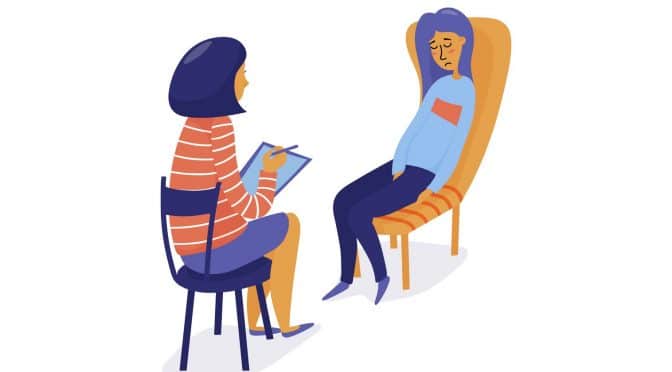Discover the Best Psychologist in Delhi for Effective Mental Health And Wellness Support
Discover the Best Psychologist in Delhi for Effective Mental Health And Wellness Support
Blog Article
Psych Treatment: A Comprehensive Guide to Results and methods

Cognitive-Behavioral Treatment
Cognitive-Behavioral Treatment (CBT) is a widely used psychotherapeutic strategy that focuses on determining and modifying dysfunctional reasoning and actions patterns. Developed in the 1960s by Aaron T. Beck, CBT integrates cognitive and behavioral concepts to resolve various mental wellness issues, including clinical depression, anxiety, and stress-related conditions.
Strategies such as cognitive restructuring, exposure therapy, and skill-building workouts are frequently utilized. Cognitive restructuring involves tough and changing negative idea patterns, while direct exposure therapy aims to lower concern and stress and anxiety through gradual direct exposure to been afraid objects or scenarios.
Evidence-based research study supports the efficiency of CBT for a vast array of psychological conditions - Best Psychologist in Delhi. Its focus on skill procurement and self-help strategies empowers clients to continue progression individually after therapy ends. The versatility and effectiveness of CBT have actually made it a cornerstone in modern psychotherapeutic practice
Psychodynamic Strategies
Rooted in the early concepts of Sigmund Freud, psychodynamic techniques focus on discovering the unconscious mind and its influence on actions and emotions. These approaches intend to discover covert ideas and feelings that may be driving maladaptive habits and emotional distress. Central to this method is the principle of inner dispute, typically stemming from unsolved previous experiences, particularly those from childhood years.
Therapists utilizing psychodynamic methods use several crucial approaches, including complimentary organization, where clients are motivated to talk easily to expose subconscious material, and dream analysis, which translates the unrealized material of desires. In addition, the exploration of transference and countertransference dynamics within the restorative partnership is crucial. These communications can give insights into the client's interior globe and relational patterns.
Psychodynamic treatment is typically longer-term compared to other techniques, using a extensive and deep understanding of the individual's mind. Research study suggests that it can be especially efficient for intricate psychological health and wellness concerns, such as individuality problems and persistent clinical depression. By cultivating self-awareness and psychological understanding, psychodynamic treatment looks for to bring unconscious material to consciousness, allowing individuals to achieve significant and enduring modification in their lives.
Humanistic Techniques
Building on the foundations laid by psychodynamic approaches, humanistic techniques offer a distinctive viewpoint concentrated on specific prospective and self-actualization. Coming from in the mid-20th century, these methods prioritize the inherent benefits and development potential of people, stressing an alternative view of human experience. Secret figures such as Carl Rogers and Abraham Maslow have actually dramatically affected this restorative approach, which incorporates approaches like client-centered therapy and Gestalt therapy.
Client-centered treatment, developed by Rogers, plays a pivotal function in humanistic strategies. The therapist's duty is more of a facilitator than an authority, motivating customers to harness their inner sources for healing.
Gestalt therapy, an additional important humanistic strategy, emphasizes present minute awareness and the combination of body and mind. By focusing on the "present moment," clients get higher understanding into their existing emotions and habits. Techniques such as role-playing and directed visualization are often utilized to assist customers gain a deeper understanding of themselves, eventually leading go to these guys to improved self-awareness and gratification.
Integrative Therapies
Integrative therapies represent a synthesis of different healing techniques tailored to satisfy the special demands of each client. This method acknowledges the intricacy of human psychology and the complex nature of psychological wellness issues. By combining aspects from various institutions of psychiatric therapy-- such as cognitive-behavioral therapy (CBT), psychodynamic therapy, and humanistic methods-- integrative therapies use an even more adaptable and all natural treatment paradigm.
Experts of integrative treatment analyze each customer's specific needs, symptoms, and individual background to devise a customized treatment strategy. This customized strategy boosts the possibility for restorative success by attending to the origin triggers of mental distress and advertising overall well-being. Methods may consist of mindfulness workouts, cognitive restructuring, and psychological handling, each chosen to target different facets of the customer's problems.
In addition, integrative treatments highlight the therapeutic partnership, watching the client-therapist bond as a vital element of effective therapy. This connection fosters an encouraging atmosphere where clients really feel risk-free to explore and resolve their issues. The flexibility of integrative treatments makes them suitable for a broad series of conditions, consisting of stress and anxiety, depression, injury, and interpersonal troubles, thereby raising their applicability and efficiency in varied medical setups.

Measuring Treatment Outcomes
Reviewing the efficiency of psychotherapy is critical for both clients and medical professionals to make sure that the treatment is producing the preferred outcomes. To attain this, numerous methods and tools are utilized to gauge therapy end results systematically. Standard analysis instruments, such as the Beck Anxiety Inventory (BDI) and the Generalized Stress And Anxiety Problem 7 (GAD-7), offer measurable data on sign extent and changes gradually.
In addition to standardized devices, qualitative approaches like client self-reports and professional interviews use valuable insights right into the personal experiences and perceived progression of clients. Regularly arranged analyses, generally at the start, omphalos, and end of therapy, help in tracking the trajectory of enhancement or recognizing areas needing modification.
End result dimension is not restricted to symptom reduction; it also includes useful renovations in life, such as much better interpersonal connections, boosted job performance, and enhanced overall well-being. Modern developments in digital health and wellness have introduced mobile apps and on the internet platforms that help with real-time tracking and feedback, further improving the assessment process.
Inevitably, a thorough approach to measuring therapy end results ensures that healing treatments are reliable, reliable, and tailored to meet the individual needs of customers, therefore view it now maximizing the general restorative experience.
Conclusion
Psychotherapy offers a complex selection of methods targeted at attending to blog particular mental health issues and boosting general wellness. Cognitive-Behavioral Therapy and psychodynamic techniques target subconscious influences and dysfunctional ideas, respectively. Humanistic strategies concentrate on personal development and self-actualization, while integrative therapies incorporate several methods for customized therapy plans. Evaluating treatment results through qualitative techniques and standardized analyses guarantees a comprehensive understanding of performance, ultimately guiding clients toward enduring mental wellness improvements.
From the organized method of Cognitive-Behavioral Treatment (CBT) to the deep expedition of the subconscious in psychodynamic therapy, each technique brings one-of-a-kind benefits. Its emphasis on skill purchase and self-help strategies encourages clients to continue progress separately after treatment wraps up (Best Psychologist in Delhi). Trick numbers such as Carl Rogers and Abraham Maslow have dramatically influenced this therapeutic method, which includes approaches like client-centered therapy and Gestalt therapy

Report this page